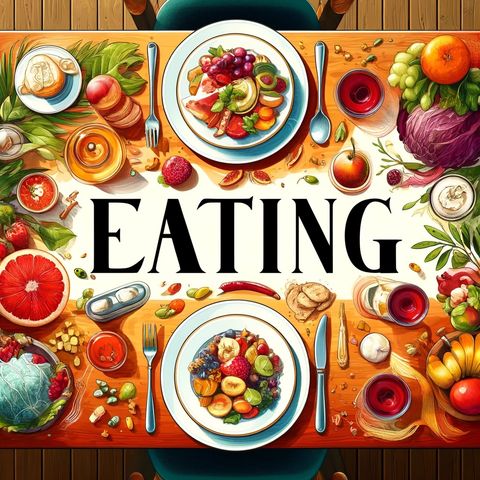Eating: A Comprehensive Overview

Descarga y escucha en cualquier lugar
Descarga tus episodios favoritos y disfrútalos, ¡dondequiera que estés! Regístrate o inicia sesión ahora para acceder a la escucha sin conexión.
Eating: A Comprehensive Overview
Esta transcripción es generada automáticamente. Ten en cuenta que no se garantiza una precisión absoluta.
Descripción
Eating is a fundamental biological process that is essential for the survival and well-being of all living organisms, including humans. It involves the consumption of food to provide the body...
mostra másThe process of eating begins with the ingestion of food, which is then broken down mechanically and chemically in the mouth, stomach, and intestines. The digestive system, consisting of the mouth, esophagus, stomach, small intestine, large intestine, and various accessory organs, works in concert to extract nutrients from the food and absorb them into the bloodstream. Enzymes, such as amylase in saliva and pepsin in the stomach, play a crucial role in breaking down complex food molecules into simpler, absorbable forms.
Eating provides the body with essential macronutrients, including carbohydrates, proteins, and fats, as well as micronutrients, such as vitamins and minerals. Carbohydrates, found in foods like grains, fruits, and vegetables, serve as the primary source of energy for the body. Proteins, obtained from sources such as meat, fish, eggs, and legumes, are vital for building and repairing tissues, as well as producing enzymes and hormones. Fats, found in foods like nuts, seeds, and oils, play a role in cell membrane structure, hormone production, and energy storage.
The act of eating is regulated by a complex interplay of hormones, neurotransmitters, and other signaling molecules that control hunger, satiety, and appetite. Ghrelin, often referred to as the "hunger hormone," stimulates appetite, while leptin, produced by fat cells, signals satiety to the brain. The hypothalamus, a region in the brain, plays a central role in regulating food intake and energy balance, integrating signals from the digestive system, fat stores, and other parts of the body.
Eating habits and preferences are influenced by a wide range of factors, including cultural traditions, social norms, personal experiences, and individual taste preferences. Different cultures have unique culinary practices, ingredients, and flavors that reflect their history, geography, and values. Social contexts, such as family meals, celebrations, and dining out, shape the way we eat and the meanings we attach to food. Personal experiences, such as childhood memories and exposure to new foods, can also impact our eating behaviors and preferences.
In recent years, there has been a growing awareness of the importance of healthy eating for overall well-being. A balanced diet, consisting of a variety of nutrient-dense foods from all food groups, is essential for maintaining good health and preventing chronic diseases such as obesity, diabetes, and heart disease. Eating mindfully, paying attention to hunger and fullness cues, and enjoying food in moderation are key strategies for developing a healthy relationship with eating.
However, disordered eating patterns, such as restrictive dieting, binge eating, and emotional eating, can have negative impacts on physical and mental health. Eating disorders, such as anorexia nervosa, bulimia nervosa, and binge eating disorder, are serious mental health conditions that require professional treatment and support.
In conclusion, eating is a complex and multifaceted aspect of human life that encompasses biological, social, cultural, and psychological dimensions. Understanding the science of nutrition, the factors that influence eating behaviors, and the importance of healthy eating habits is crucial for promoting overall health and well-being. By cultivating a mindful and balanced approach to eating, we can nourish our bodies, minds, and souls, and enjoy the many pleasures and benefits that food has to offer.
Información
| Autor | QP-4 |
| Organización | William Corbin |
| Página web | - |
| Etiquetas |
Copyright 2024 - Spreaker Inc. an iHeartMedia Company
